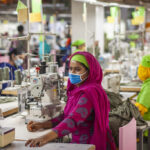

As climate change continues to wreak havoc on Bangladesh’s agricultural sector, innovative solutions and sustainable practices are emerging as key to securing a brighter future for the country’s farmers and their families. Bangladesh relies heavily on its agricultural sector, which employs almost half of the country’s workforce. However, climate change is having a significant impact on the sector, with rising temperatures, flooding, and other extreme weather events leading to reduced crop yields and increased vulnerability. In this context, promoting sustainable agriculture practices is essential to ensure the long-term viability of the sector and the livelihoods of millions of people. While there is a growing recognition of the importance of sustainable agriculture in Bangladesh, there are still many challenges to overcome.
Climate change impacts: Bangladeshi farmers are grappling with issues such as reduced crop yields due to changes in temperature and rainfall patterns. Their vulnerability to natural disasters like floods, droughts, and cyclones is only getting aggravated. Bangladesh, which is a rice producer, a produce that is not only most vulnerable climate change, but also major source of greenhouse gas emissions. There is a need to understand the peculiarity and specificity of rice cultivation and consumption in the country to develop targeted technology and solutions.
Lack of awareness of sustainable farming practices: Many farmers still use conventional methods that are not sustainable. The biggest challenges facing Bangladeshi farmers is poor productivity and yield. Traditional knowledge is no longer working, and farmers are also waking up to it. However, there is paucity of new information and technology coming to the farmers. However, the sector is also hugely fragmented, making reach at scale a challenge.
New information and ‘ways of doing’ related to sustainable agriculture practices need to be promoted widely among the farmers, to help them to “produce more, sell more, process more”. Further, value addition is key to ensuring growth in agricultural produce. There is need to move away from generic advisory to customized and specialized advisory services that are action oriented. For instance, innovative initiatives such as support services to provide cattle insurance to farmers along with advisory to make livestock more productive and limit methane emissions hold potential towards making Bangladeshi agriculture sector more climate smart.
Innovative solutions such as carbon credits can help to mitigate these emissions. Under the carbon credit system, farmers who adopt sustainable rice farming practices that reduce emissions can earn credits that can be sold on the global carbon market. These credits represent a reduction in greenhouse gas emissions and can be purchased by companies and governments to offset their own emissions.
Further, the Sustainable Rice Platform has been working to promote sustainable rice farming practices and support farmers in earning carbon credits. By participating in the carbon credit market, rice farmers in Bangladesh can not only contribute to the global effort to mitigate climate change but also benefit financially from their sustainable farming practices.
Access to finance for smallholder farmers: Smallholder farmers often lack the capital to invest in sustainable farming practices. There is also limited access to credit or loans to support investments in agriculture. Financing small holder farmers has always been risky, and climate change has further worsened. There is a need to commercialize agriculture, enabling investment by government and development agencies as well as the private sector. Opening the agtech sector to private sector players can support scaling up innovations.
Further, solutions such as Rice Exchange is a platform that facilitates the trading of rice and other agricultural commodities, providing a transparent and efficient marketplace for buyers and sellers. The exchange also provides farmers with access to international market information and prices, enabling them to make informed decisions about what to grow and when to sell. Further, a Rice Fund can provide financial support to farmers for various activities such as seed production, cultivation, and marketing. The fund can improve access to credit for farmers and promote the use of modern technology in rice farming. Together, these innovations can help to promote sustainable and profitable rice farming in Bangladesh by providing farmers with the financial and market support they need to succeed.
Inadequate infrastructure for storing and transporting crops: Timely access to markets for their produce on time to avoid losses is imperative. However, poor storage facilities lead to post-harvest losses and reduced incomes. Further, limited transportation options often lead to delays and increase transportation costs.
It’s important to note that these challenges are interrelated and can compound one another, making it difficult for farmers and the agricultural sector to adopt sustainable practices. Addressing these challenges will require a multi-faceted approach, involving various stakeholders and innovative solutions.




